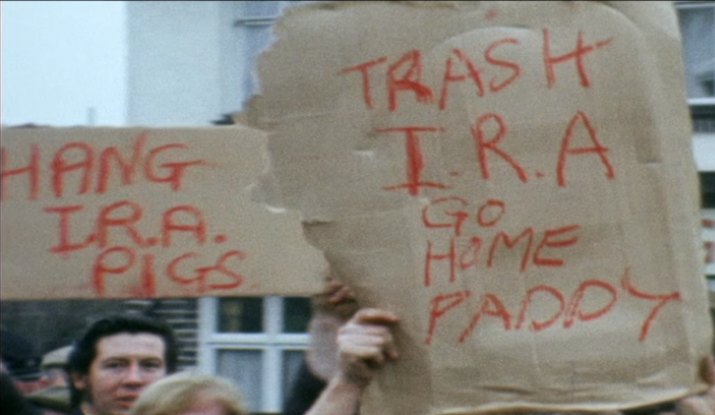There are a couple of days left to catch Stephen Nolan’s documentary A Great British Injustice: The Maguire Seven on the BBC iPlayer. The miscarriage of justice suffered by an ordinary family of Northern Irish extraction living in London in the 1970s is not just some “old case” (as I recall Kenneth Clarke as Home Secretary saying [1]) – new interview material in the documentary shows that it is a continuing trauma for those who were abused in police custody and wrongfully convicted of terrorism offences, and there is contemporary resonance in the police investigative, forensic and disclosure failures highlighted by Annie Maguire’s solicitor Alastair Logan.
One detail that particularly caught my attention was a media clip from 1976, in which the journalist John Stapleton credulously expounded the official line shortly after the convictions, for a segment that was broadcast on Nationwide (2). His account was so striking that I decided to transcribe it:
So what type of person is behind this terrifying campaign? Where and how do they hide in London? Could one of them be your next-door neighbour? These days, terrorists seem to have adopted different tactics. Now, they send highly trained specialists here several months before the planned operation, the idea being that the specialists can absorb themselves in the community and at the same time awaken people known as sleepers.
Probably the most notorious of all sleepers was this woman, Annie Maguire. Annie Maguire had lived in England for 20 years; as far as her neighbours were concerned, she was just an ordinary, indeed a rather friendly housewife.
What they didn’t know was that along with her husband Patrick and their two sons, one of them not even 14 years old, Auntie Annie – as she was known to her terrorist friends – was a vital cog in the bombers’ machine. Not only did she train new recruits how to make bombs, she actually stored explosives in the kitchen of this, her home, just like you might keep tins of corned beef.
The place became known as “Auntie Annie’s Devil’s Kitchen”. Well now, that kitchen is closed.
As Stephen Nolan adds in his commentary on this: “Every one of [those] sentences was wrong”. So where did all this nonsense come from?
Stapleton’s reporting, it seems to me, reflects the logic and language of moral panics, which are revealed in sharpest relief in Satanic Ritual Abuse claims. Our “next-door neighbours” may be secretly dedicated to a wicked conspiracy, their domestic arrangements an obscene inversion and parody of the mundane: “she actually stored explosives in the kitchen of this, her home, just like you might keep tins of corned beef.” The case for Maguire’s guilt verges on the non-falsifiable, since the implausibility of her involvement becomes evidence that she was actually a “sleeper”, sent to the UK more than a decade before the conflict in Northern Ireland had even started.
The parallel with SRA is underscored by the phrase “Auntie Annie’s Devil’s Kitchen”, which suggests that Maguire and her “terrorist friends” recognised their own evil and revelled in their transgressions. This bit of Brass Eye absurdity does not appear in any other account that has made it online; It seems to have been an escalation from the phrase “Auntie Annie’s Bomb Factory”, which appeared in earlier reporting and at least reflected how a terrorist might conceivably refer to a bomb-making facility.
Have lessons been learnt? Perhaps – but botched reporting on terrorism threats (remember breast-implant bombs?), fiascoes around “VIP abuse” allegations and continuing police disclosure failures suggest that the malaise is perennial. And Nolan’s documentary also notes that public anger against Republican terrorism in the 1970s was expressed in crudely anti-Irish terms during protests – another detail with modern parallels.
Footnotes
1. I quote from memory of a broadcast news interview. Most likely this was after the publication of the May Report in late 1992, although I can’t be sure. Clarke referred to the “old cases” of the Maguire Seven, the Guildford Four and the Birmingham Six, as if they were some legacy anomaly from long ago that now at last had been tidied up.
2. The clip also has a page on the BBC website, although the extract itself cannot be viewed at the moment (“Sorry, this clip is not currently available”). The blurb attempts to distance Stapleton from the pseudo-account he presents, saying that he “describes the activities the court believed took place in ‘Auntie Annie’s Devil’s Kitchen’.”
Filed under: Uncategorized | 1 Comment »



